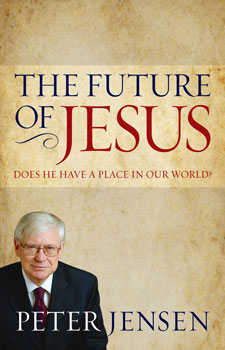For Christians convicted of and even perhaps too comfortable in their faith, it might seem somewhat confronting, even worrying, that an Archbishop would be penning a book titled The Future Of Jesus " Does He Have A Place In Our World?
But in a world where faith is being challenged by the equally religiously held views of the likes of Richard Dawkins, this is the question we increasingly need to be able to answer.
The book is adapted from the very successful Boyer Lectures of the same title, originally presented in 2005, and Peter looks first at the history of Christ and Christianity; as indeed any attempt to understand the future must.
 He identifies the uniqueness of the claims of Christ and the sheer unlikelihood of such claims and the claims of followers about His resurrection, gaining any traction in an individualistic pagan society which saw death on a tree as a curse. Add to this the subsequent rigorous assault by history and science, each with no place for miracles, and Peter leaves us with the realisation that Jesus finding a place in the future might only be half as challenging!
He identifies the uniqueness of the claims of Christ and the sheer unlikelihood of such claims and the claims of followers about His resurrection, gaining any traction in an individualistic pagan society which saw death on a tree as a curse. Add to this the subsequent rigorous assault by history and science, each with no place for miracles, and Peter leaves us with the realisation that Jesus finding a place in the future might only be half as challenging!
The book then takes modern ideas and constructs head on, first describing them with an integrity that almost has you believing the author might adopt them, before he intelligently and rationally analyses them and provides Jesus as the alternative solution to the questions they put.
It is this discourse that will prove so valuable to contemporary Christians or those seeking Christ.
Peter examines notions of free society and secularism, whose values he points out: are either thin or come basically, if unwittingly, straight from Jesus. He questions the relevance of our rampart individualism for a community of people hard wired for other people and for moral meaning; and even whether as Australians we should be seeking to stake our national identity in the less substantial and less relevant myths drawn from Eureka and Gallipoli, than in a book that is in reality the history book of and for Western culture.
This is a most valuable book. It is full of intelligent argument and fact to assist those confronted daily with secularist positions to counter them and put the case for the relevance of Christ. The strength and structure of the argument and its short 124 page length, makes it ideal to give the seeker or the knocker, who you can then challenge to discuss their views with you after reading it.
In fact, for Peter, a significant stimulus for the work was a question from a "sympathetic agnostic" who asked "How can Jesus enrich the lives of unbelievers?"
If you're into Christ and into defending his relevance to today and to the future, this book's for you.






















